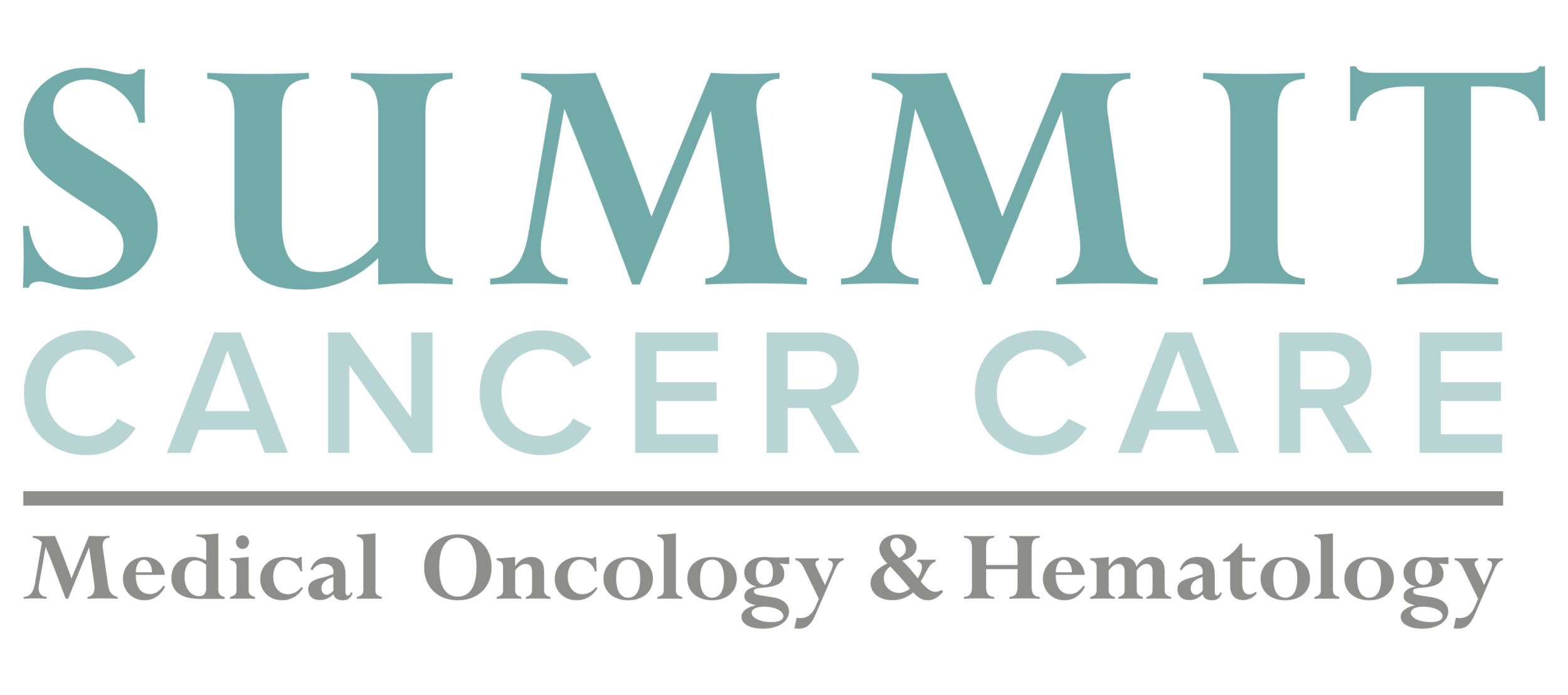
A blood disorder or cancer diagnosis can introduce you to a new set of emotions, a different medical vocabulary, and a host of anxieties.
At Summit Cancer Care, you are not just a patient with a disease; you are a person with whom we will travel on your journey to healing. Our care team treats each other and patients like family. Your first visit with Summit Cancer Care is your first step toward regaining control over your health. This is when you’ll meet the team who will be by your side in your fight for your health. It’s a time to ask questions, learn about treatment options and talk about your concerns. Knowing what to expect from your first visit will help you get the most out of it.
What to expect at your first visit
Complete Intake Forms
When you check in at our office, you’ll be asked to fill out and sign various forms that are important in enabling us to provide care to you, including:
• Patient Information and Authorizations
• Patient History Form
• Preferred Pharmacy, Laboratory, and Hospital Information Sheet
• Consent for Release of Medical Information
Laboratory Testing
Before you arrive for your first visit, our physicians will have reviewed the medical information sent by your referring doctor. If this information indicates the need for any lab tests, you will go to our in-house lab or a free-standing lab facility to complete any recommended testing.
Physician Exam and Assessment
Our medical assistant will take your vital signs and also ask a list of questions to include inquiring about any medications you are taking. Your physician may go over some of these questions with you once in your private examination room. Expect a physical examination to be performed by your physician. Finally, there will likely be a discussion of medical findings, possibly a list of further tests that may be needed, and if applicable, treatment options.
Please note: DURING COVID, your visit may occur virtually – utilizing either interactive video options or a phone conversation.
Patient Education
If treatment is required, your physician may schedule a patient education visit with one of Summit’s Advanced Practice Providers. During this visit, the we will discuss your specific treatment plan and anticipated side effects. You will be asked to sign an informed consent document stating you've received this treatment education and giving consent for Summit to treat you with your designated, agreed upon medications.
Treatment Day FAQs
We have the facilities to administer intravenous therapy at our locations in Savannah, Statesboro, and Springfield, Georgia; as well as Bluffton, South Carolina. Intravenous therapy means that the medication needs to be administered directly into your vein. Treatments are prepared by pharmacists and pharmacy technicians specially-trained in oncology. Nurses who are certified by the Oncology Nursing Certification Corporation will administer your treatment. You can be assured you are receiving the most up-to-date and safest treatment.
Here are some common questions you may have about your treatment day:
Can I eat on my treatment day? Can I bring food with me?
Yes!! Please eat a good breakfast on your treatment day. We want you to maintain your normal meal schedule and not skip any meals. Although we offer a few selections of drinks and snacks, you should plan to bring a lunch if your treatment is going to last more than two or three hours. We ask that if you do bring food, please understand that some patients are extra sensitive to strong smells; therefore, please refrain from bringing foods that would trigger a negative response. It is a good idea to stick to food that is easy to digest on your treatment day.
How long will my treatment take?
Everyone’s treatment takes a different amount of time. We will let you know approximately how long your treatment will take when we schedule your treatment day. You may need to see either your physician or one of our advance practice providers before we begin your treatment to ensure that everything is in order. You also may need to visit our lab or an outside lab on or just prior to your treatment day.
Will my intravenous therapy treatment hurt?
Since your treatment needs to be given in your vein, we will need to start a small IV. If you have a permanent access device such as a port-a-cath, our nurses are specially trained to access and teach you about your device. You may be nervous about needles and we understand your fears, that’s why we do everything we can to make you comfortable, from using the smallest needle we can, to using numbing spray on your port-a-cath site. We ensure you that all of our IV nurses have years of experience and are all very good at starting IVs. After your IV is started, the administration of your medication is painless.
What would be helpful to bring to my treatment?
We provide comfortable recliners, pillows and blankets. You may have a favorite blanket or pillow and you are welcome to use it. We provide a small selection of magazines at our treatment sites but you are encouraged to bring anything that will entertain you such as a laptop or portable tablet or smart phone with headphones. If you are on pain medication or any other medication that has a schedule such as insulin, please bring your medications with you.
Do your treatment rooms have WiFi?
Yes! You are welcome to join our guest WiFi in our offices. We kindly ask that you utilize headphones or ear buds to minimize disruptions to other patients.
Can I bring my family or friends with me?
During COVID, we are restricting our office to patients only unless there are extenuating circumstances. We understand the importance of a good support system; however, since the majority of our patients have compromised immune systems, we are confident you understand the importance of limiting exposure to other people.




